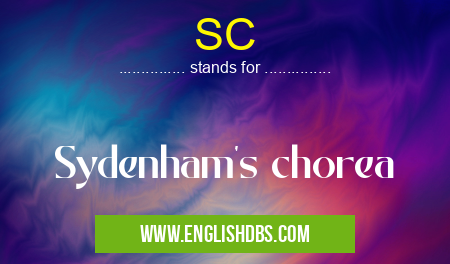What does SC mean in DISEASES
SC is a childhood-onset neuropsychiatric movement disorder characterized by involuntary, purposeless, and abrupt muscle movements. It is associated with rheumatic fever, an inflammatory condition often triggered by untreated strep throat.

SC meaning in Diseases in Medical
SC mostly used in an acronym Diseases in Category Medical that means Sydenham's chorea
Shorthand: SC,
Full Form: Sydenham's chorea
For more information of "Sydenham's chorea", see the section below.
- SC is a medical abbreviation that stands for Sydenham's chorea.
SC Meaning in MEDICAL
- SC is a neurological disorder that affects children, typically between the ages of 5 and 15.
- It is characterized by involuntary, jerky movements of the face, limbs, and trunk, often accompanied by emotional lability and behavioral changes.
- SC is caused by an infection with the bacterium Streptococcus pyogenes (group A streptococcus).
SC Full Form
- Sydenham's chorea
What Does SC Stand For?
- SC stands for Sydenham's chorea.
Essential Questions and Answers on Sydenham's chorea in "MEDICAL»DISEASES"
What is Sydenham's chorea (SC)?
What causes SC?
SC is caused by a reaction of the body's immune system to streptococcal bacteria, the same bacteria that cause strep throat. The bacteria trigger inflammation in the brain, specifically in the basal ganglia, which controls movement.
What are the symptoms of SC?
Symptoms typically appear 2-3 months after a strep infection and include:
- Involuntary, rapid, jerky movements of the face, limbs, and trunk
- Grimacing, shoulder shrugging, excessive blinking, and tongue protrusion
- Difficulty with coordination, writing, and fine motor skills
- Mood swings, irritability, and emotional instability
- Fatigue and weakness
How is SC diagnosed?
Diagnosis is based on a medical history, physical examination, and laboratory tests to confirm a recent streptococcal infection. A doctor may also order imaging tests to rule out other conditions.
How is SC treated?
Treatment focuses on managing the symptoms and preventing complications. Medications such as antipsychotics, benzodiazepines, and botulinum toxin can help reduce involuntary movements. Antibiotics are used to treat any underlying streptococcal infection.
What is the prognosis for SC?
The course of SC varies, but symptoms usually improve within a few months. In most cases, the movements gradually subside, and the child makes a full recovery. However, some may experience long-term movement difficulties or psychiatric symptoms.
Final Words:
- SC (Sydenham's chorea) is a neurological disorder caused by a streptococcal infection.
- It is characterized by involuntary movements and emotional disturbances.
- Early diagnosis and treatment with antibiotics are essential to prevent long-term complications.
SC also stands for: |
|
| All stands for SC |
